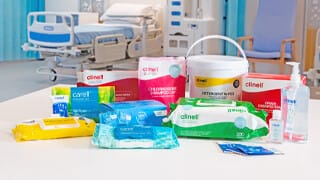Posted
23rd March 2019
Research
Computer keyboards are a potential contamination risk in the hospital setting. A new systematic review of the literature concludes that computer keyboards are frequently contaminated and that more studies are required to understand the risk they pose and effective and practical methods to prevent and reduce contamination.

Computer equipment in hospital settings, such as keyboards, mice, and smartcard readers, frequently become contaminated with pathogens that can cause HCAI and are difficult to clean and disinfect. Furthermore, hand hygiene rarely follows contact with computer equipment in clinical settings. Since computer keyboards are handled by multiple staff groups, and since hand hygiene practice is rarely optimal, pathogenic organisms could be deposited onto keyboards by one staff member, and acquired on the hands of subsequent staff members, fuelling the spread of pathogenic organisms in hospitals.
Improved design and disinfection of computer keyboards has been shown to reduce the level of microbial contamination, and so reduce the risk of transmission. For example, Clinell EasyClean computer keyboards, mice, and smartcard readers have been designed to simplify cleaning procedures and increase compliance.
The review identified 75 studies including data from 2804 individual computer devices. Around one third of these studies also reported on the efficacy of disinfection methods for computer keyboards. The most common organisms found to contaminate keyboards in healthcare settings are, unsurprisingly, skin commensals. However, potential pathogens including MRSA, C. difficile, and VRE have also been identified. Disinfectant wipes were one of the methods found to be effective in tackling contamination of computer keyboards. The review concluded that more studies are required to scale the risk of computer keyboards as a potential fomite for the transmission of pathogens in healthcare settings.
SHARE THIS ARTICLE
Tags
Latest News
Celebrating 20 Years of GAMA Healthcare: Our Story
This month, GAMA Healthcare celebrates 20 years of helping prevent…
Norovirus: Understanding its transmission and prevention in the UK
Introduction Norovirus is recognised as the leading cause of viral gastroenteritis…
Clean Between to Reduce Healthcare-Associated Infections
Healthcare-associated infections (HAIs) are a significant concern for healthcare facilities…
Mpox: emergence of a new threat
A new threat related to mpox is emerging, in the…










